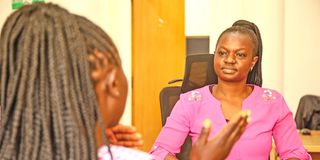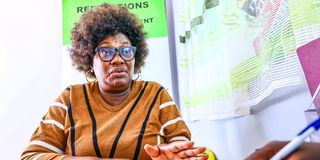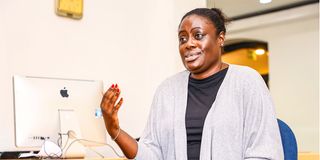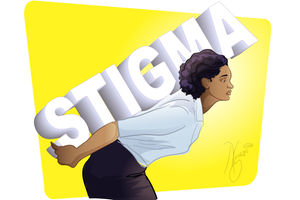
Nation Media Group's reporter Tebby Otieno (right) during an interview with a survivor of the 2007 post-election violence who has a child born out of rape.
The year is December 30, 2007. It is a Sunday night in Kariobangi, a low-income neighbourhood in Nairobi. An 18-year-old girl who had dreams of becoming a journalist had been left alone in the family’s rental home. Her stepmother, whom she was living with, had travelled to the village for Christmas festivities.
“It was chaos outside. I had leftover vegetables that I was to eat with ugali that night. While still contemplating whether to cook ugali or not, I heard a push on the door, and in less than a minute, it was broken down. People carrying weapons got into the house. They were many, I can’t remember how many they were,” she tells Lifestyle.
Mary* (not her real name), breaks down during the interview as she narrates a heart-breaking incident that happened 17 years ago. She had thought that the armed men would only steal household items and leave. They did steal, but before they left, they raped her. Not one man. Not three.
“They first asked me who I stay with and I told them with my mum. They then started carrying things from our house. Suddenly, someone grabbed me and tore my clothes. I was terrified. I could not defend myself. I cannot remember how many of them raped me because they were many men,” she says, wiping tears rolling down her cheeks.
It was pitch black outside as the area had a power blackout. The men dashed into the darkness and left the door ajar, knob broken. Fearing that they might return, she went to a neighbour’s house. “I got out of our house, walking in pain through a dark corridor and knocked at a neighbour’s door. They didn’t open, perhaps for fear of being attacked. But I knocked persistently, whispering their names. A woman later opened for me and asked me what happened to me,” she says.
At the time, she says, she did not know that she was supposed to go to the hospital or report to the police about the rape. “But even if I did, how would I have walked to the police station through such chaos?” she says.
The neighbour helped her clean up herself and gave her painkillers to ease the immense pain. The memories of that day kept flashing in her mind. Weeks later, she missed her period. “My life was shuttered at that moment. I realised that I was pregnant. Already I was out of school because of lack of fees. My stepmother had no stable income,” she says.
Mary’s mother had died when she was 10 years old. She came to Nairobi to stay with her stepmother and her father. When she was 13, her father died. She struggled to stay in school and eventually dropped out in Form 3 due to a lack of school fees.
“The year I was raped, I was to be in Form 4. If my parents were alive, I’d not have dropped out of school because of school fees arrears,” she says in tears.
She contemplated an abortion, but the clinician who was to do the procedure asked her to pay an amount that she did not have. For nine months, she endured the stares and murmurs of neighbours, some who doubted that she had been raped.
“They said I lied that I was raped. Some said I was already pregnant before the rape incident,” she says.
In September 2008, she gave birth to a baby girl.
“The baby boy came at night, instead of happiness I was so sad because it reminded me of the night I had been gang raped. I thought of running away from the clinic and abandoning the baby with the midwife. I wanted to disappear to someplace nobody could ever find me,” she says.
But she did not.
“My stepmother made me accept my daughter. She had no children of her own despite longing for them. When she saw my baby, she told me that a baby is a blessing. She helped me to take care of her, but unfortunately she also died when my baby was barely two years old,” she says.
As a single parent, Mary turned to menial jobs to provide for her baby.
“Over time, I learned to love my baby, but I have no kind words to the men who gang raped me, may they be cursed forever,” says the 35-year-old, “I believe I could be living a better life had I finished school and pursued a career, and gotten married.”
Thousands of men and women were subjected to untold suffering at the height of Kenya’s 2007-2008 post-election violence. More than 1,300 people were killed and many more were displaced from their homes. Thousands were raped, but the government failed to investigate the sexual violence and prosecute the perpetrators. In 2016, Human Rights Watch released a report about women and girls raped during the period. The rights group said it spoke to more than 163 women and girls, some of whom were gang raped by as many as 10 men.
Sodomised too
Peninah*, not her real name, is also raising a baby born from rape. When she was raped, they sodomised her too. It was an afternoon and she was walking in Kibra slums when she felt a sudden knock on her head. She had been hit by a blunt object from behind. “It was 2pm. I had just had lunch with my husband and I was going to my mother’s house. I gained consciousness after getting first aid at a health facility and went home. Hours later I started feeling strange in my private parts. My innerwear was stuffed in my dress pocket,” says Peninah, who was 25 years old at the time.

Lifestyle Editor Diana Mwango (right) during an interview with a survivor of the 2007 post-election violence at Nation Centre, Nairobi on December 20, 2024.
Scared of telling her husband, she kept quiet. But the symptoms of being unable to control stool and urine, as her bladder and anus had been perforated, got her husband curious. “Most times my clothes were stained from either urine or stool or both,” she says.
When he demanded to know what happened to her, she finally told him that she had been gang raped, and sodomised. This disclosure put a strain on her marriage.
“Life is so unfair. I wanted to commit suicide because this was not the first time I had been raped,” she says. When Peninah was 14, she got pregnant after getting raped, forcing her to drop out of school. Her first-born daughter, born out of rape, is 25 years old now.
“When I found out I was pregnant again out of rape, I tried to abort. I didn’t know much about safe abortion, so I went to a herbalist who gave me concoctions. I took it and vomited blood, but the pregnancy remained intact. I never went back for a second dose, I decided to keep the pregnancy,” she says. After five months of battling denial, she finally started attending antenatal clinics. At the clinic, she got another shock. “I was HIV positive,” she says.
The baby came in September 2008 and her husband had no kind words. “My husband used to insult my baby. He told his family about the rape and my in-laws used to call me, the cursed one. I walked around with shame,” she says, “so I thought if I gave my husband his own child, it’d save the marriage.” In 2010, she gave birth to her third child, also a girl. This time round, a child who would know her father. But it was not to be because her husband walked out of the marriage.
“I used to run a beauty shop in Kibra but it was destroyed during the post-election violence. One of my legs was disabled after a road accident and I cannot walk or work as I should,” she says.
During the interview, soil falls off the walls of her mud house onto our laps.
“Look, I stay in a mud house because I can’t afford to work and earn rent, even in a slum,” says the 41-year-old, “some days the soil falls onto our food, we either sleep hungry or just eat it. The government should build decent homes for survivors of post-election violence who were raped so that they can have decent roofs over their heads with their children.”
Seeking justice

Jackline Matere, founder of Grace Agenda, an organization working with survivors of Post Election Violence during an interview at its headquarters in Kibera on November 9, 2024.
According to Grace Agenda, a community-based organisation seeking justice for survivors of sexual violence and their children, there are 57 women raising children born from rape during this period. These mothers are in Mombasa, Nairobi, Naivasha, Eldoret, Kericho, Kisii, Kisumu and Busia.
Jackline Mutere, the founder of the Kibra-based organisation, says a majority of these mothers attempted to secure safe abortions but failed. Although these mothers are gradually learning to love their children who are turning 17, with those who have not dropped out from school being in secondary schools, she says that it took many counselling sessions for them to come to terms with the reality.
“Some of them didn’t accept the pregnancies, and even after the children were born, they still did not accept them. Some of the children are so alienated from their mothers, so much so that they cannot even touch them. These children experience trauma through their mothers, and so there is a big gap between them,” says Jackline.
Seeking justice has not been possible for survivors like Mary and Peninah, who did not report the cases to police. Jackline says that police officers at the time overlooked rape cases, not viewing them as urgent concerns. Through her organisation, she hopes that survivors of the post-election violence can get justice for restoration, compensation, dignity, and rehabilitation.
“Some of the survivors are very vulnerable, some of them suffer from post-traumatic stress disorder, and psychosocial disorders because of the trauma that is unresolved in the system. We offer them one-on-one counselling sessions,” she says.

Yvonne Oyieke, a Lawyer and Executive Director of Utu Wetu during an interview at Nation Center Nairobi on November 9, 2024.
Yvonne Oyieke, a lawyer and Executive Director at Utu Wetu, says that even though survivors like Mary and Peninah did not report the rape, they can still seek justice. However, she says that proving that they were raped 17 years ago might be difficult.
“A child is a constant reminder of the trauma that these women went through, and the fact that there is no justice means that they continue to deal with the pain. There is also the stigma associated with assaults. When someone is raped, the shame is on them not the perpetrators,” says Yvonne.
She points out that during the post-election violence, some parts of the country were so hostile that women could not get to safe places like hospitals and police stations to seek treatment or report. The situation, she says, was made worse due to a lack of knowledge of what to do after rape.
“Despite all, a child should receive care from both parents, but where they are not, then the state must ensure that they put in place the necessary safety and social measures to supplement what they are not getting from their parents,” she says.
There is also a lingering question. Will these mothers ever tell the children they were born from rape? How do you tell a child that her father is a rapist?
“It is important for a child to know that they are still loved and cared for despite how they were conceived. It is a difficult conversation that must be done with as much care and concern as possible for the child. It is best if that information is relayed from a parent or a close family member rather than a child hearing it at school when others make fun of them,” says Yvonne.








